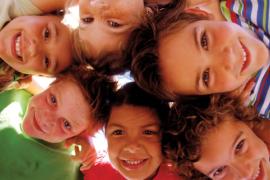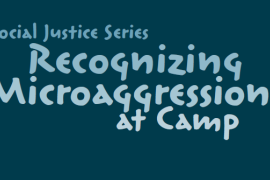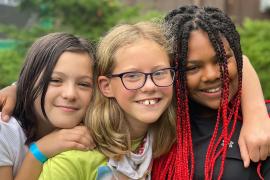An interview with Nick Teich, founder and CEO of Camp Aranu’tiq
| Social Justice This interview is part of Camping Magazine's series on social justice, exploring social issues in the context of individual camps and the camp community as a whole as a way to spark further conversation and inspire positive change. Contact Ann Gillard (anngillard@gmail.com) if you would like to participate or contribute to this series. |
Camp Aranu'tiq of Harbor Camps is a nonprofit program serving transgender and gender-variant youth and their families. Camp Aranu'tiq is for those who feel they do not fit into the norms our society has prescribed for gender. This includes those who have "transitioned," those who happen to express their gender differently than others, and those who may experience teasing or bullying because of their gender. Aranu'tiq is a Chugach word (from the Yup'ik, an Indigenous people of Alaska) for a person who was thought to embody both the male and female spirit. Aranu'tiq people were often revered and thought to be very lucky because their existence transcended traditional boundaries.
Camp Aranu'tiq was founded in 2009 by Nick Teich, LCSW, who dreamed of a safe and fun place for youth who felt like they might not fit in at other camps because of their gender and/or who wanted to be with others like them. They launched their first summer week in New England in 2010 with 41 campers. They now have flagship summer camps in New Hampshire and California, as well as leadership programs for older teens and weekend family camps, serving 550 campers over the course of a year. Aranu'tiq runs weeklong and multiweek camps for new campers ages eight to 13 and returners ages eight to 15 in New Hampshire and Southern California, weekend family camps for all ages in New Hampshire and Southern California, and weeklong summer leadership camp for ages 16 to 18 in New Hampshire. Campers can come back until they age out of each program as long as there is room.
Aranu'tiq is not a therapy camp and is in most ways a very typical overnight summer camp; its population (and great people) is what makes the camp unique. Aranu'tiq does not hold formal discussions about personal experiences of gender, though, of course, many campers talk about it with each other.
Counselors are a mix of staff and volunteers who help create a wonderful place for youth. Many return summer after summer and about half to two-thirds of the counselors at each program are trans-identified. Camp Aranu'tiq feels it is important to have role models who are of all gender identities and expressions and seeks a diverse group of staff and volunteers. The application process includes interviews, references, and background checks. Teich took some time out after the summer to chat with me about Camp Aranu'tiq's approach to supporting transgender and gender-variant youth. Here is what Teich had to say about social justice, edited for space and clarity.
What approaches does Camp Aranu'tiq take to ensure gender-related equity and justice?
We ask the parents and we also ask the children when they're new campers what their gender story is. We get some sort of perspective on whether they're still on their journey, whether they're in transition, whether they're socially transitioned, or whether they're just questioning. We can get a sense of where they are.
Then we ask the campers how they want to be bunked. The choices we give are trans-masculine spectrum cabins, trans-feminine spectrum cabins, and gender neutral. To date, we have not gotten enough kids who wanted gender neutral cabins in a specific age group that we were able to put that to use. We actually only have had kids in trans-feminine spectrum cabins and trans-masculine spectrum cabins. Having said that, it's not as if they're boys' and girls' cabins. Say someone who is on the trans-feminine spectrum is somebody who identifies as female, or more feminine than typical person labeled male at birth. That's sort of how we put it to them. It's a very broad spectrum, so we definitely get gender, nonbinary kids, or third gender, gender queer, or gender variant, or anywhere in between — but these are kids who feel like the trans-feminine cabins fit them, for example.
Within the trans-masculine and trans-feminine cabins there is an entire range of gender going on. That's sort of the whole Aranu'tiq approach. All of our bathrooms are gender neutral. You can just use whatever bathroom is closest to you at the time you need it. Nothing is split. Campers' activities aren't split; their tables aren't split. We just really have adequate supervision and safety measures in place; besides that, we really don't care what's going on with people's anatomies. That is not a primary concern with us in terms of whether they're going to be in the bathroom together. We find it just makes everyone a bit more comfortable because usually outside of camp they are dealing with situations with bathrooms, wondering "Am I going to fit in here?" We have a pretty free approach to that.
What sort of results have you seen in people who experience that sort of environment where people don't care about anatomies?
They feel very free. They feel like they don't have to defend themselves or explain themselves or even pay attention to it. They can concentrate on camp and having fun and being kids. Of course, they're talking about it with each other all the time, just getting support and making friends, knowing that they've all been through similar things. I think the really important thing is that it takes away that anxiety of the bathroom and everyone worrying about what kind of anatomy they have. When you take that out of the equation they feel much freer to be themselves.
Why is it important for kids to feel free about gender, to be themselves?
I think it's the same for anybody: If you can't be yourself in the most elemental sense, then what can you do? How can you have confidence and resilience, which as counselors is what we want to instill in our kids. If you can't be yourself, then there's no way you can accomplish anything. I think the importance is huge, and once you're able to go and really not worry about having to be something that you're not, you can learn new skills. You can make new friends. You can gain a sense of independence and confidence that you have a camp, that we want you too. I think you can't do any of that if you're starting from this false-self place.
Thinking not only about Aranu'tiq, but camps in general, what are three wishes that you have for camps regarding social justice?
I wish that camps would be able to see the health and well-being of campers and be able to feel strong enough to use that as a way to explain to the parents to whom they have to answer that their fears of transgender kids are their own concern. In other words, how can we get parents to see that the campers' safety and ability to be themselves is paramount, that all campers need to feel safe and be themselves, and that parents' worries about "transgender kids in my kid's bunk" are secondary? I wish camp directors wouldn't be so scared.
My second wish would be that people would look at any difference (not just transgender campers) as a looming opportunity, not as a reason to get worried thinking about "What's going to happen and how do I handle the situation and do I have everything? I'm not going to take this camper until we have absolutely everything in order." And I think, while there's something to that, a lot of it is panicking that's not necessary. Just take the camper's lead and say, "You are the first camper to come to our camp who is [fill in the blank], and we want to make this a great experience for you. How can we help you?"
Really ask the parent and the camper, "How can we be most helpful?" and let them take the lead instead of thinking that before you have that conversation with the parents and campers you have to be an expert in something. Just slow down and think about it very rationally: "What would I want if I were a different camper coming to this camp?" I would want to know that the camp was safe and that the staff were looking out for me. The first way to help that along is to ask directly, "What can I do?" and involve the families.
The third wish is figuring out how counselors can help kids distinguish between anxiety and going outside their comfort zones. In our camp, it's particularly heightened because they're dealing with anxiety from being transgender all the time. How can we get the campers to get to a place where they parse out the difference between true anxiety and going outside their comfort zone and be able to articulate that and have counselors be able to say to the campers, "I'm glad you articulated that. Now we're going to push you a little bit outside your comfort zone and you're going to do things that maybe you haven't before."
I think counselors can often be persuaded by the kids that it's their anxiety, and sometimes that may be the case, but in some cases that may just be the way they're describing their fear of rock climbing, for example. Can we get them to go up five or six hand holds the first day and then a little bit more the second day? Can we get them to do that stuff? I think if we let them opt out all the time, it's doing them a disservice. We as camps need to set out as some of our goals this resilience and confidence and independence, engaging the campers in that conversation. "I understand you feel anxious. Are you sure you feel anxious, or maybe you feel that you don't want to do this because it's pushing outside your comfort zone? Those are two different things." Then just listen to their answer and go with that.
What advice do you have for other camps wishing to promote genderrelated justice and equity?
Don't be so scared. Think about this step by step. Instead of thinking about the endgame consequences of what could happen if somebody who didn't have the same anatomy as her bunkmates drops her pants (which is what I hear all the time), let's step back a little bit and ask, "What is best for the well-being of the kids?" Don't go to that worst-case scenario. Start by thinking about how this can work, how it won't be a big deal, and how it might even teach tolerance to other campers and counselors and parents. That's my biggest piece of advice: Stop and think.
I think a lot of courage is needed. It's really not hard. Just like camp directors work with every camper before they sign up or apply to camp — what questions are you asking them on the application? Do you meet them in person? Do you talk to them on the phone? You know something about them. It's that same kind of work with a little different spin. It's not rocket science, it's really not. I think people get so worried about how hard it's going to be and then, inevitably, afterward they're like, "Hey, this was not that hard and it worked out great."
Additional Resources
For more information, visit the Camp Aranu'tiq website at camparanutiq.org. Also, refer to the following:
Camping Magazine
- 20/20 Toolbox: Everybody's In, Nobody's Out! By Bob Ditter, May/June 2009
- 20/20 toolbox: Transgender Youth — The Role Camps Might Play, by Sarah Holder, September/October 2011
- Does Your Camp Reinforce, Resist, or Relieve Gender Stereotypes? by Ann Gillard, PhD, March/April 2012
- How Can Camps Support Transgender Youth, by Ann Gillard, PhD, November/ December 2016
CampLine
- Transgender Staff and Anti-Discrimination, by Nick Teich, April 2015
Book
- Transgender 101: A Simple Guide to a Complex Issue, by Nicholas M. Teich (2012)




